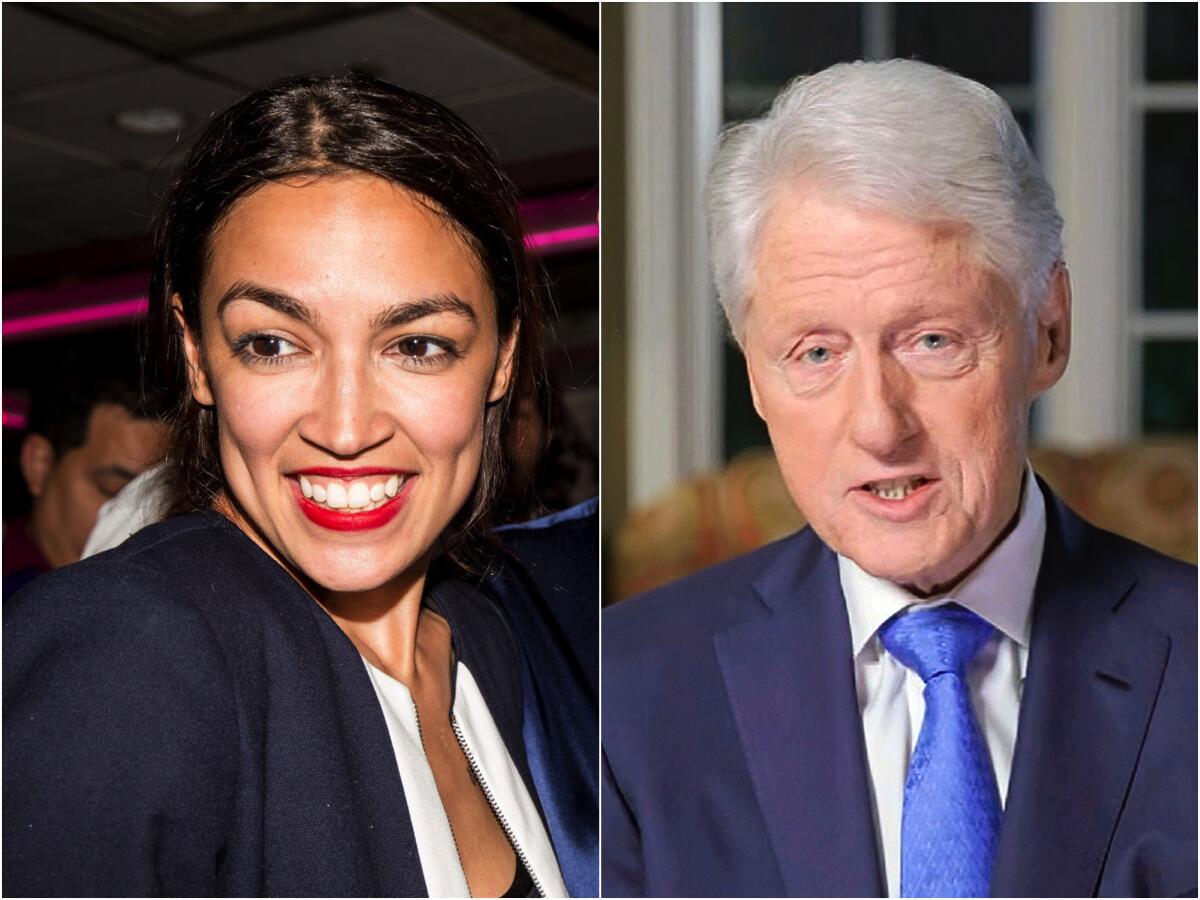Democrats want young voters, but showcase old faces

- Share via
WASHINGTON — When Bill Clinton gave his convention acceptance speech in 1992, Rep. Alexandria Ocasio-Cortez was a toddler.
Clinton, whose presidency steered the party to the center a generation ago, returned to the convention podium Tuesday night as a gray-haired party elder; Ocasio-Cortez, a rising insurgent pushing the party to the left, got a snippet of speaking time.
The two personify a yawning gap within the Democratic Party between baby boomers who have dominated party leadership for decades and a rising generation of more progressive, diverse younger people.
The 2020 Democratic convention may do little to close that divide: The program aims to put the party’s best face forward, but so far it is still mostly a wrinkled one.
The presidential nominee, Joe Biden, at 77 is a few years too old to be a baby boomer. His running mate, Sen. Kamala Harris of California, was hailed for her relative youth when Biden named her, but at 56 on inauguration day would be older upon first taking office than every Democratic president since Harry Truman.
Biden is not in much danger of losing young voters to Trump, but he does have to worry about losing them to apathy. Polls show voters younger than 35 are lagging in enthusiasm for him, and many Democrats worry about whether they will turn out in an election where voting will come with multiple logistical challenges because of the pandemic.
“The key for us is to make sure that we make the case for voting to a generation that‘s seen as less likely to vote at all,” said Pete Buttigieg, the 38-year-old former South Bend, Ind., mayor whose own presidential bid was framed around a call for generational change, speaking in an interview.
“He is winning overwhelmingly among younger voters; the important thing is just to make sure that there is no question about whether it is important to vote,” Buttigieg said of Biden.
Party conventions are traditionally a way to make that case and build enthusiasm. Tuesday night, with its keynote address, is often a time to spotlight new talent.
This time, however, while a montage of younger officials opened the proceedings, the lineup at the time-crunched virtual convention remained heavily skewed to luminaries who could boast, as several did, that they had known Biden for decades.
The age of political leaders is not the only, maybe not even the most important, factor in determining who will excite and engage younger voters. Sen. Bernie Sanders, the oldest candidate in the 2020 presidential field, was a youth sensation.
But Biden is often out of step with the strong progressive slant that dominates among young Democrats. In addition, his style, his approach to politics and his personal experiences draw from a world very different than the one in which voters in their 20s and early 30s have grown up.
The Biden campaign acknowledges the need to reach out to millennials, who as of 2018 became the largest generation of eligible voters, and to the even younger voters coming after them.
“We’re using the convention to communicate directly with young voters — through our rising stars, party leaders, and ordinary Americans — about how Joe Biden and Kamala Harris are ready to confront the huge challenges facing our country after four years of Trump’s chaos,” said Biden campaign spokesman Mike Gwin, “and we’re doing so in an engaging format that allows us to reach voters of all ages no matter how they consume news.”
Joe Biden is trying to reach young progressive voters, including many Bernie Sanders fans. Here’s what some of them want to hear from the former vice president.
Tuesday’s lineup spotlighted emerging leaders like Stacey Abrams, 46, who ran unsuccessfully for Georgia governor in 2018, and an ethnically diverse lineup of young members of Congress, state legislators and local officials.
The segment, which opened the night, was a substitute for the traditional keynote address that at past conventions gave a chance for standouts to shine, as Barack Obama, still a U.S. Senate hopeful, did in 2004. The spotlight was more diffuse in the 2020 remake, which packed 17 young elected leaders into a 10-minute time slot. They delivered a joint, staggered speech that showcased diversity but made it impossible for any one of them to stand out.
Later in the evening, Ocasio-Cortez formally seconded the nomination of Sanders for the roll call, praising him for leading a “mass people’s movement working to establish 21st century social, economic and human rights.” But she was allowed to speak for only about a minute and a half, an allotment her allies considered insultingly small for a rising Democratic leader, especially when Republican John Kasich spoke for four minutes Monday night.
Biden’s nomination postpones the passing of the generational baton in a party where baby boomers have been slow to move off the track. Many thought that handoff had begun with Obama’s election in 2008. But baby boomers reasserted themselves with Hillary Clinton’s nomination in 2016.
Last year, the big field of primary candidates introduced voters to a fresh batch of younger Democratic leaders. But amid the turmoil of the Trump era, Democratic primary voters once again turned aside arguments for new leadership, opting for the steady, experienced hand that Biden held out.
The Biden campaign is betting that in this fall’s election, young voters’ desire to oust Trump will overshadow any reservations they have about the former vice president. In an August Washington Post/ABC News poll, voters under 40 favored Biden over the president by a 62%-29% margin.
The poll also found, however, that while 44% of Biden voters said they were “very enthusiastic” about his candidacy, just 25% of those under 40 said so.
Campaign officials hope that naming Harris as Biden’s running mate will inspire more excitement among younger voters, especially people of color. But that remains to be seen as many young Black voters are wary of her background as a prosecutor.
“Her presence on the ticket is very exciting. She is certainly more digital-savvy and more comfortable being herself in the public space,” said Amanda Litman, co-founder of Run for Something, a group that supports young progressive candidates. “But younger voters are more progressive than where she is on some issues.”
Whatever is accomplished by this week’s convention, a survey by the Alliance for Youth Action, a progressive group that promotes youth voting, suggests the Biden campaign has a lot of work ahead of it.
An August poll of young “persuadable” voters — Democrats and Democratic-leaning independents — in 10 swing states found that nearly 40% had not heard from the Biden campaign either by phone, digital ads or other forms of outreach.
“They are running out of time,” said Sarah Audelo, executive director of the alliance.
“This election is not about convincing young people that Donald Trump should not be president. They know that. It’s about convincing young people to turn out to vote at all, to navigate many hurdles to voting that will exist, and that Joe Biden is the person that they should vote for.”
More to Read
Get the L.A. Times Politics newsletter
Deeply reported insights into legislation, politics and policy from Sacramento, Washington and beyond. In your inbox three times per week.
You may occasionally receive promotional content from the Los Angeles Times.











